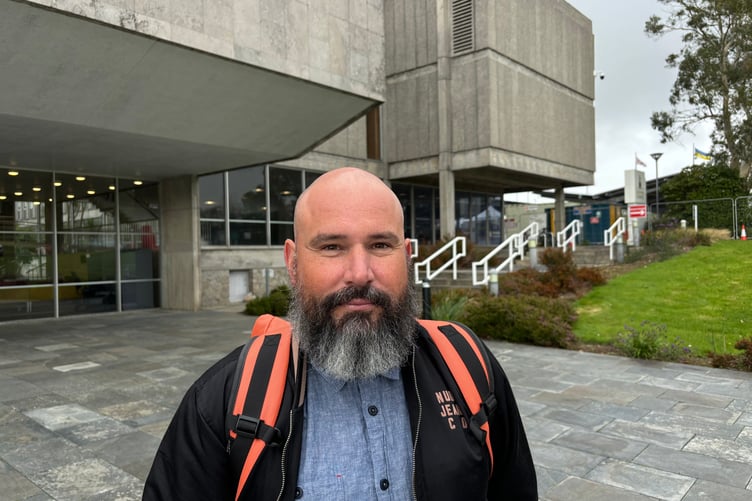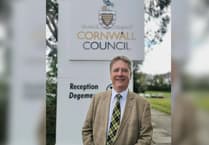A meeting to discuss controversial plans for Cornwall Council to enter into a deal to develop 650 acres of land to ensure the survival of loss-making Newquay airport heard the future for Cornwall would be “quite bleak” without the changes.
The council’s economic scrutiny committee met on Tuesday, October 1 to discuss the progress of proposals for a joint venture with private finance company Adynaton to develop the site.
The committee expressed serious concerns about the ongoing negotiation process and was “troubled” by the apparent lack of audit and risk assessment. The meeting heard there still isn’t a final deal on the table, so the Cabinet approving it at its meeting on November 13, as previously planned, may not now be possible.
Senior officers such as Phil Mason, strategic director for sustainable growth and development, and Glenn Caplin-Grey, service director for economy and skills, continually stressed it was important to arrive at the “right deal and not a quick deal” despite the desire among members’ to get rid of the annual £4 to £5-million subsidy running the airport costs the Cornish taxpayer.
The meeting heard from officers and the airport’s managing director, Sam O’Dwyer, that because of operating costs, its size and the geography of Cornwall, the airport as currently run will never break even, let alone make a profit.
They stressed that the airport needs to adapt to be a success and that means the commercial development of the council-owned 650-acre airport estate, which in turn will allow the airport to expand with a new terminal. “Without using the land-based assets, we’re not going to close the gap,” said Mr Mason.
He added that although the land needs capital investment for development, the council itself was not in a financial position to do so on its own, hence the proposed deal with a partner. “You’re going to have to make difficult choices in this and the next administration,” he added.
Cllr Louis Gardner, the council’s portfolio holder for the economy, added that in order for the airport to break even it would need to treble its passengers to 1.5 million a year or ensure each passenger spends £70 at the airport – which would be more than is spent at any airport in the UK. “Neither of those are realistic. What is realistic is to look outside the current model for a new model.”
Cllr Peter Channon, an aviation expert, said that most successful airports are backed by income from their estates. He said it was an “absolute no-brainer” and something that Cornwall Council had failed at previously with its own airport estate at Newquay.
As the matter of the annual subsidy was discussed at length, the council’s deputy leader David Harris said: “We expect our partner to contribute sufficient monies to deal with the deficit. Getting rid of that subsidy is our golden ticket. There is no way on this earth that we are going to walk away with a bad deal. It’s going to get scrutinised deliberately by officers, by Cabinet, by our advisers and your committee as well.”
The meeting heard there will be an extraordinary meeting to discuss the finalised deal. A Land Use Blueprint (LUB) outlines what sort of activity will take place at the airport. Mr Caplin-Grey said: “You will notice there is no residential development on the drawing, there’s no nuclear power plant, there are no extensions to military bases – which are some of the things which have been said publicly with concerns about what we’re trying to do.”
Among the developments, which would take place in zones across the airport estate, are a new commercial and public terminal building, an executive air hub with heliport, expansion of storage hangars, a green power and energy plant, expansion of Spaceport Cornwall and adjacent manufacturing park, an airport hotel or hotels, and a regional Data Centre.
The meeting heard there could also be an opportunity to use the site in relation to the Celtic Sea offshore wind farm.
Mr Caplin-Grey added there is no suggestion in the deal that the running of the airport would be moved from its current operator Cornwall Airport Limited (CAL), a private limited company owned by Cornwall Council.
John Brown, the chief executive of Cornwall Chamber of Commerce, addressed the committee and admitted there was a “rocky start” to consultation on the project, but he said his members had now welcomed robust talks with all those involved.
He highlighted it was “utterly crucial” to private investors to have an operating airport for them to “fly in, meet astonishing Cornish businesses, hopefully hand over bucketloads of cash and then fly back out again and be back in home for tea at their private members’ club in London”.
Mr Brown made it clear that the airport partnership strategy should not be used for party political point scoring: “We’re going to get tired of this being a political football and it’s too important for that. If this requires greater time so you have broader commitment across the political spectrum then give it that time. It’s too crucial for a partnership to be entered into and then further along the line due to various political movements – and by the look of things we’re in a fair bit of political turbulence locally – for it to fall by the wayside.”
He added: “What there is genuine enthusiasm for among our members, from Cornish Lithium to some of our great educational institutions, is to work with the partner and Cornwall Council to make sure whatever investment is made is a sustainable one, and one that lifts the floor of the Cornish economy as well as raising the ceiling. If it doesn’t work out I think the landscape becomes quite bleak.”
Following a six-hour meeting, the scrutiny committee resolved that the “council welcomes future investment in the airport and its estate but public ownership and control of the airport must be retained”.
It also passed a resolution expressing “serious concerns about the ongoing negotiation process as significant details remain unclear. The timing with only months until a new council administration is unfortunate and we are troubled by the apparent lack of audit and risk assessment, which we consider essential. At this point there is no clarity regarding the scale or nature of proposed development”.
A recommendation to defer the final partnership decision until the next administration, which will be voted in next May, to “allow sufficient time for clearer outcomes and further scrutiny ensuring a well-informed and considered decision” was lost.
The committee, which will scrutinise the final deal before Cabinet makes a decision, also voted in favour of holding an inquiry to explore lessons from other airports, including the issue of public ownership, and options to maximise the success of the airport within the context of Cornwall Council control and ownership.





Comments
This article has no comments yet. Be the first to leave a comment.